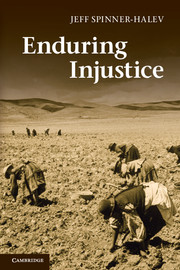5 - Legitimacy and the cast of history
Published online by Cambridge University Press: 05 June 2012
Summary
The specter of history rarely haunts liberals as much as it should. Eighteenth- and nineteenth-century liberals wanted to learn from history, but they wanted to begin anew, to begin a new historical trajectory. Yet now recent history in many of the Western democracies is a liberal history, so to ignore history is to ignore the practices of liberal governments – or to ignore the practices often implemented in the name of liberalism. My argument about history and memory in the previous chapters has focused on understanding enduring injustices: many can only be understood by taking the collective narrative of the victims into account, and their solutions need to be historically informed. Here I turn from the collective narratives of the victims of enduring injustice to the history of liberal states, which matters in important ways. This argument is implicit in my previous discussion of mistrust, an issue I return to here. I argue that acknowledging the history of the practices of liberal states that have caused or contributed to enduring injustices complicates the idea of implementing liberal justice in some historically oppressed communities because it questions the legitimacy of the liberal state.
I begin this chapter with a brief discussion of non-ideal theory, which is the framework for the political arguments I put forth in this and the ensuing chapters. I then turn to what I call a detour from liberal justice. In some cases, the history of an enduring injustice suggests that a temporary deviation from liberal principles is needed to ensure the realization of liberal justice. I then show how the history of an enduring injustice will sometimes question the legitimacy of the state's authority over the group, at least in a partial way. Many of the arguments that insist that these groups protect the individual rights of their members work within a framework of liberal justice and progress that ignores the history of enduring injustices; these arguments wrongly assume the justice and legitimacy of the liberal state in cases of enduring injustice.
- Type
- Chapter
- Information
- Enduring Injustice , pp. 120 - 157Publisher: Cambridge University PressPrint publication year: 2012



